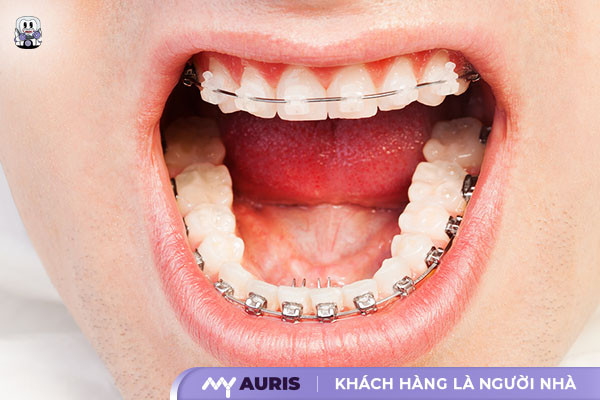In the current healthcare system, health insurance is an essential tool that helps people reduce the financial burden of medical examinations and treatments, including services related to dentistry. Many wonder: Are dental examination costs covered by health insurance? Let’s find out to proactively protect your oral health and finances more effectively!
Which Dental Procedures Are Not Covered by Health Insurance?
Braces
Braces are a common orthodontic solution in modern dentistry, helping to correct dental imperfections such as overbites, underbites, and crooked teeth, restoring confidence and improving chewing function. However, many still wonder: Are braces covered by health insurance?
According to Article 23 of the current Health Law, dental procedures not covered by health insurance are typically elective cosmetic services. Braces are classified as a type of elective cosmetic orthodontic treatment and therefore are not within the scope of dental and maxillofacial health insurance coverage.

Tooth Implants
Tooth implants are a cosmetic restorative method chosen by many to replace lost teeth, helping to restore chewing function and improve the aesthetic appeal of the smile. Thanks to advanced techniques, there are now many options such as porcelain tooth implants and dental implants with leading-edge technology. However, these methods often come with high costs due to expensive replacement materials and the requirement for highly specialized skills from dentists.
One common question nowadays is: Are tooth implants covered by insurance? According to current health insurance law, tooth implants are classified as a high-quality cosmetic procedure requested by patients and are not included in the list of covered services. Therefore, tooth implants are not covered by health insurance, unless there is a medical indication from a doctor in cases of severe pathology. This legal regulation is consistently applied across the national health insurance system.

Porcelain Crowns
When participating in health insurance, policyholders have the right to benefits related to medical examination and treatment costs. However, according to current health insurance law, some cases are not covered by insurance, including cosmetic orthodontic procedures or examinations requested by patients.
Porcelain tooth restoration, including porcelain crowns, is an elective cosmetic dental service. Therefore, porcelain tooth restoration is not covered by health insurance and is not included in the list of dental and maxillofacial health insurance benefits. This service falls outside the scope of insurance coverage because its primary goal is to improve appearance rather than treat a medical condition.

Which Cases Does Dental and Maxillofacial Health Insurance Cover?
As society develops, health awareness significantly improves, leading to a demand for prioritized social welfare for citizens – fostering a civilized and egalitarian society. In this context, dental and maxillofacial health insurance plays a crucial role in ensuring dental health for everyone.
Dental Examinations
According to current health insurance law, the health insurance fund covers medical examination and treatment services if they are not already covered by the state budget. The covered list includes dental examinations for dental problems, not routine general check-ups. When undergoing dental examinations for oral diseases, policyholders will receive support from the insurance agency for examination costs and medication costs – so you can rest assured with treatment, without worrying about losing benefits.
Tooth Extraction
Many people ask, “Is tooth extraction covered by health insurance?” The answer is: yes. In cases of deep tooth extraction, crooked wisdom teeth removal, impacted teeth, or tooth extraction due to unavoidable pathological conditions affecting health, health insurance covers the cost of tooth extraction. Conversely, tooth extraction for aesthetic purposes (e.g., extracting teeth for braces) without a doctor’s indication will not be covered by cosmetic tooth extraction insurance.
Dental Fillings (Restorations)
Dental fillings (restorations) are also covered by health insurance when the filling is performed due to an oral disease and is indicated by a doctor, provided it is not covered by the state budget. If teeth are decayed or suffer from oral diseases requiring fillings, the insurance organization will cover the costs – you are fully entitled to dental filling insurance with associated benefits.
What Percentage Does Dental and Maxillofacial Health Insurance Cover for Examinations and Treatment?
When there is a need for medical examination, treatment, and rehabilitation, especially in the field of dentistry and maxillofacial care, many people wonder what percentage dental and maxillofacial health insurance covers. According to current regulations, benefits under social insurance policies apply to cases of regular pregnancy check-ups, childbirth, or disease treatment, but the percentage of coverage depends on the patient’s condition and the healthcare level.
Medical Examination and Treatment at the Registered Health Insurance Level
Patients receiving medical examination and treatment at their registered health insurance level will receive benefits covered by the health insurance fund as follows:
- 100% of medical examination and treatment costs for subjects specified in points a, d, e, g, h, i of Clause 3, Article 12 of this Law. If there are costs outside the scope of health insurance benefits, these will be covered by the state budget if the health insurance fund is insufficient.
- 100% of costs for patients examined at the commune level or in cases where costs are lower than the level stipulated by the Government.
- In cases where patients have continuously participated in health insurance for 5 years or more, and the total co-payment amount within the year is greater than 6 months’ basic salary, they will also receive 100% of medical examination and treatment costs, except for self-initiated examinations outside the registered level.
- 95% of medical examination and treatment costs for subjects specified in point a, Clause 2, point k, Clause 3, and point a, Clause 4, Article 12 of this Law.
- 80% of medical examination and treatment costs for other subjects.
Medical Examination and Treatment Outside the Registered Level
In cases where patients receive medical examination and treatment outside the registered level, they still have benefits but at a lower rate:
- At central-level hospitals, health insurance covers 40% of inpatient treatment costs.
- At provincial-level hospitals:
60% of inpatient treatment costs until December 31, 2020.
100% of inpatient treatment costs from January 1, 2021, nationwide.
- At district-level hospitals:
70% of medical examination and treatment costs until December 31, 2015.
100% of medical examination and treatment costs from January 1, 2016.

Healthcare Facilities That Accept Dental and Maxillofacial Health Insurance
Currently in Vietnam, there is no separate insurance specifically for dentistry. Dental services are primarily integrated into comprehensive health insurance packages, rather than being separate like other specialties. Whether using state-supported insurance or opting for packages provided by insurance companies, people should still clearly understand the insurance policy and benefits before enrolling.
Currently, healthcare facilities that accept dental and maxillofacial health insurance are typically public medical facilities at the correct level or public medical facilities at an unregistered level. For patients receiving treatment at these facilities, health insurance will cover a percentage of the costs depending on the patient’s specific case. Additionally, some private hospitals also accept health insurance, depending on local regulations and the treatment level.
If you use an insurance package provided by an insurance company, you can accept insurance coverage and benefits at healthcare facilities that have signed an insurance contract. Additionally, you need to check if your insurance card is on the guarantee list and if it includes the name of the treating healthcare facility to ensure full benefit payment.
The article above has shared information related to dental and maxillofacial health insurance to help you gain a better understanding of insurance types and acquire necessary knowledge before deciding to participate. Please consider carefully before enrolling in any type of insurance to ensure your oral health benefits are protected most effectively.





